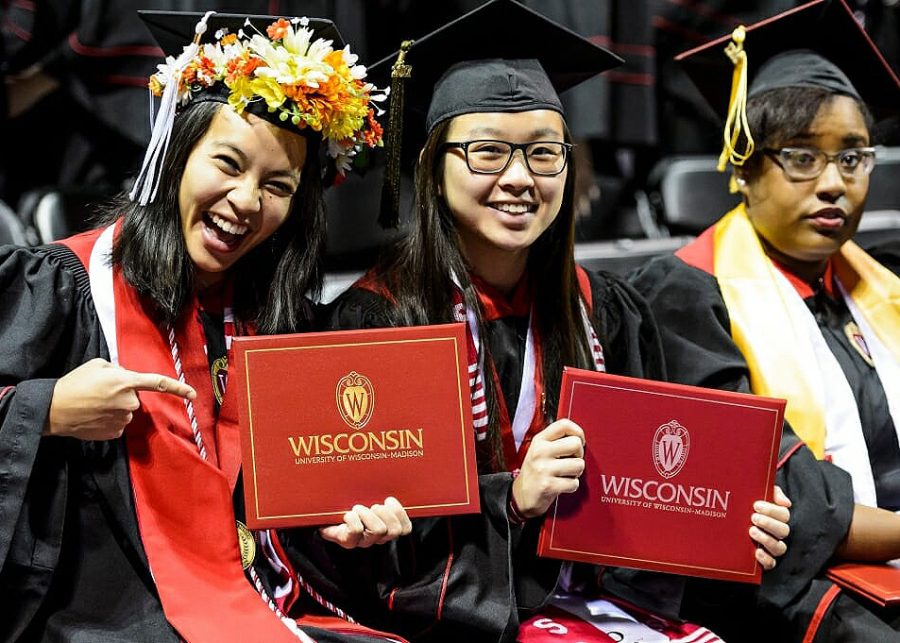Should Alma Matter?
Academic pressure, extracurriculars, stress and sacrifice. The blood, sweat and tears that go into cultivating the perfect resume for an Ivy League university. Society has long been fixated on achieving the American Dream, teaching that attending a top university is essential to success. In fact, submitting a job application boasting “Harvard” at the top is almost guaranteed to be met with an offer. In the flawed American college system, however, professional aspirations come at the cost of priceless sacrifices. Perhaps it is time for a change: it is in the best interest of the nation to ban job applicants from disclosing their university.
The effects of the bias currently present in the professional world is detrimental. When organizations mostly recruit people who attended prestigious universities, it becomes a widespread notion among students that getting into those schools is essential for a bright future filled with various opportunities.
Cynthia Wang (IV) says, “Many schools, including our school, treat getting into college as either ‘you get in, and you’ll be successful,’ or ‘you don’t, and you’re a failure.’” Hoping for a better future, students are attracted to the prestige associated with attending a “top school.” This makes them feel obligated to spend excessive time solely focusing on academics and extracurriculars to be admitted into these high-ranked institutions.
These motives, however, support unhealthy lifestyles because they cause students to neglect their genuine passions, relationships and sometimes, even their health. Wang continues, “The pressure to attend good colleges is so immense that it practically takes over a highschooler’s entire life […]; your entire school career is only about getting into a good college, and that’s it.” Expanding beyond individual consequences, this mindset fosters a competitive and demanding environment. Finding a job is especially challenging because there is a higher demand for “more qualified” workers, where qualifications are measured depending on where one’s higher education was received, resulting in an unfair recruitment process for countless organizations.
Maya Tran (III) says, “[Hirers] should base [someone] off of their work ethic, their capabilities and what that person has done and what they’re willing to do, instead of things like the college they went to.” The absence of university names will help students pursue what they enjoy and live more fulfilling lives because they are no longer pushed to believe that their future is so heavily based on resume particularities. Prohibiting applicants from disclosing their university also promotes more fair hiring guidelines, taking the first steps towards erasing bias and stigma from all career fields.
Many universities often fail to recognize and admit truly eligible students, as their judgment is clouded with bias. According to The Atlantic, admissions officers often do not judge everyone fairly and equally and do not spend enough time reviewing each candidate, sometimes overlooking perfectly qualified applicants.
Along with its prestige, secondary education in America is notorious for its absurdly high tuition, making financial obstacles a significant factor in deciding what university to go to. Many students who receive acceptance into top schools are forced to turn them down simply because they cannot afford it. If job applicants were prohibited from disclosing their university name, these institutions would lose a large amount of their prestige and would have less of a valid reason to back up their costs, most likely reducing unaffordable tuition.
Furthermore, there is a notion that it is harder to earn degrees at prestigious universities, therefore making those graduates “more qualified.” Boston Latin School Latin teacher Mr. John Kerpan counters, “For most degrees, I don’t think that happens. […] At Harvard, you get more support, more opportunities, so just because the course load looks more impressive on paper, that doesn’t necessarily mean [students] work harder.” To earn any degree, students must meet specific requirements, regardless of their school. These standards provide a better benchmark of one’s qualifications than the college they attended.
The current college enrollment system is unfair and steeped in bias, so not attending a prestigious university should not determine one’s future opportunities. Implementing this ban will provide more opportunities for everybody, and above all, bring more equality and fair judgment to a system that had previously promised just that, but has failed to enact it.







